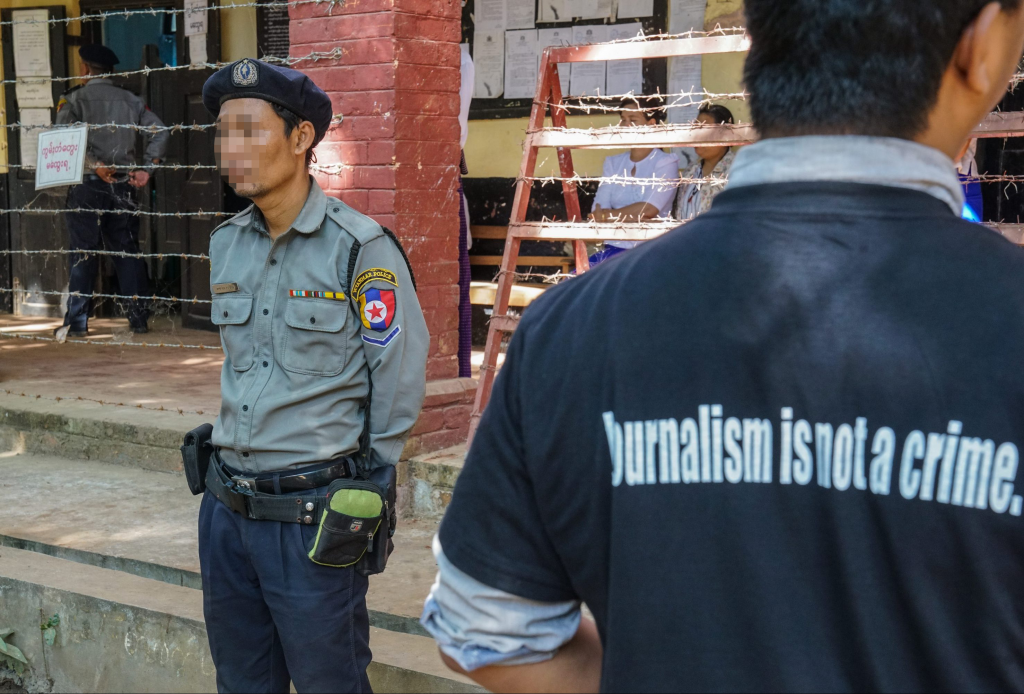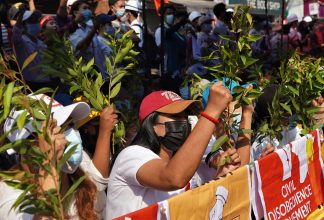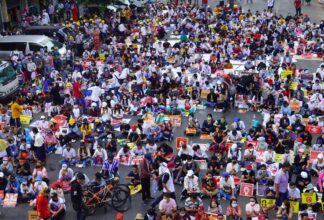Burma Intensifies Attacks Against the Media as the World Looks Elsewhere

In the shadow of the global health threat posed by the COVID-19 pandemic, Burmese authorities have stepped up their game and launched a new crackdown on freedom of expression. Hundreds of websites have been blocked, journalists prosecuted, and the internet remains shut down in large parts of the country. At the same time, the violence in western Rakhine State is raging, and those trying to report on the situation are increasingly being silenced.
The UN Secretary-General António Guterres recently called for “immediate global ceasefire in all corners of the world”. Urging warring parties to put down their weapons, he asked for support of the “bigger battle against COVID-19”. But at the same time, the seemingly never-ending violence in the Rakhine State is reaching new heights.
At either side of the ongoing ethnic conflict stand the Burma Army and the Arakan Army – an armed guerrilla group operating in the Rakhine state. Through guerrilla warfare and intensified fighting, the Arakan Army has lately become an increasingly challenging enemy in the eyes of the Burma Army, and the group was recently labelled as a terrorist organisation by the Burmese government. This has led to a situation where any news reporting relating to the group is associated with great risk. The journalist Khaing Mrat Kyaw is one of the journalists who were recently indicted under the draconian terrorism law for reporting about the conflict.
On paper, Burma has had a democratic government since 2015 – with Aung San Suu Kyi and her National League for Democracy (NLD) at the forefront. But the military still rules behind the scenes and journalists who report on military operations run the risk of imprisonment and protracted legal processes.
“Journalists have duty to get both sides interview in order to have balance for their news. We all expected that we would have more press freedom when the NLD became the government. But, it was not true indeed,” wrote Lawi Weng, an Irrawaddy senior reporter on his Facebook page.
Nay Mo Lin, the well-known editor of the Voice of Myanmar, also faces reprisals after he published an interview with the leader of the rebel group.
“I was accused under two charges of the counter-terrorism law,” he told reporters after leaving the court in Mandalay in Northern Burma. Nay Mo Lin now risks life-imprisonment.
Burma’s president, who has limited powers, later announced that the charges should be dropped, and Nay Mo Lin was released after being forced to promise never to report anything relating to the Arakan Army again. The message is clear: journalists will be in trouble if they share any information the military intends to keep secret.
On 23 March, the Burmese Ministry of Communications and Transport ordered local mobile service providers to block 221 websites, including those accused of publishing “fake news”. The order was made under section 77 of the Telecommunications Law, which may be used in “emergency situations”. The ongoing COVID-19 pandemic is used as motivation for the blocks.
The censoring of information, legal threats against independent journalists, and crackdown on press and media freedoms will inevitably lead to difficulties when it comes to reporting the full scope of human rights abuses currently taking place in the country.
Taking into account that Burma is currently facing genocide charges, the lack of independent reporting will be devastating. In January, Burma was ordered by the International Court of Justice to take provisional measures for the protection of the persecuted Rohingya people. Without independent voices and non-governmental reports, the international community will have little way of knowing or assessing what, if any, measures are being taken.
Using the COVID-19 pandemic as a blank check to quash dissident and impose disproportionate restrictions on freedom of expression and media freedoms is very serious. We call on Burma to cease the crackdown and ensure freedom of expression, press freedom, and access to information be respected in accordance with their international obligations.
We Are Watching.
Authoritarian governments must not use the corona pandemic as an excuse to repress human rights or silence critical voices. We are watching you. We will call out human rights violations and hold you accountable. Keep track of the world with us here.
Read more
